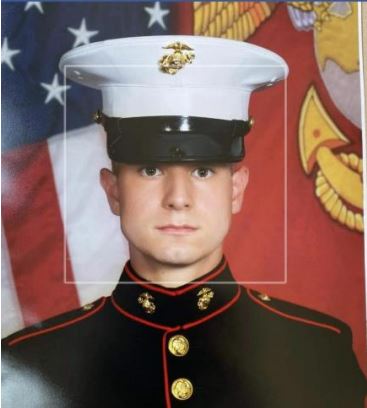Over a two-month period last year, a Marine lance corporal stationed at Camp Pendleton sold 22 unregistered “ghost” rifles, most of them featuring unlawfully short barrels, to an undercover federal agent in exchange for $23,300.
At Christian Ferrari’s sentencing Monday morning in federal court in San Diego, U.S. District Judge Cynthia Bashant asked the now-former Marine what he thought the un-serialized, hard-to-track rifles would be used for, especially given that he was selling them to unknown individuals for cash in parking lots around San Diego County.
“Sometimes I just don’t think that far ahead, your honor,” Ferrari, a 23-year-old El Cajon resident, told the judge.
Bashant sentenced Ferrari to three years and one month in federal prison, plus three years of supervised release. The judge told the defendant, who pleaded guilty in January to four counts of dealing firearms without a license, that he created “enormous danger” and was fortunate that the AR-15-style rifles he sold weren’t used to kill anyone.
“I’m sorry you didn’t think through the consequences, but the consequences were dire,” Bashant told Ferrari, adding that he should have assumed the guns would be used for nefarious purposes based on the nature of the rifles themselves and how the deals were conducted. “… You made an impulsive, stupid decision.”
Ferrari and his attorney told the judge that he was remorseful for his actions and knew that what he did was wrong. “I realize how stupid it was,” Ferrari said. His attorney argued in sentencing documents that Ferrari’s actions were largely fueled by untreated attention-deficit/hyperactivity disorder, or ADHD, which causes inattention, hyperactivity and impulsivity.
Camp Pendleton officials said last year that Ferrari enlisted in the Marine Corps in January 2020 and at the time of his arrest was a rifleman with 1st Marine Regiment, an infantry regiment that’s part of the 1st Marine Division.
Ferrari said in court Monday that he was no longer in the Marine Corps. Marine officials did not immediately respond Monday to questions about Ferrari’s discharge.
Federal agents arrested Ferrari in May 2023 moments after he sold 10 short-barreled rifles to undercover agents in a parking lot off Murphy Canyon Road. Over three previous meetings before that final sale, Ferrari had sold the agents 12 other AR-15-style rifles, including 10 short-barreled guns.
Prosecutors said Ferrari came to the attention of law enforcement during an investigation by the Riverside County Sheriff’s Office, which learned from a confidential informant that Ferrari was a Camp Pendleton Marine involved in making and selling un-serialized firearms. Sheriff’s investigators passed along the tip to the Bureau of Alcohol, Tobacco, Firearms and Explosives, telling ATF agents that Ferrari would be expecting a call from a prospective buyer.
During the third sale, undercover ATF agents told Ferrari that the guns they were buying would be taken to Northern California to protect illegal cannabis grow sites. During the same conversation, one agent said he wanted 10 more rifles for an associate in Mexico. Those statements did not deter Ferrari, according to prosecutors.

“Ferrari had overwhelming indications that the (privately made firearms) he was manufacturing and selling were likely being bought and used by criminals, and that the firearms would likely be leaving the United States into Mexico,” Assistant U.S. Attorney Shital Thakkar wrote in sentencing documents. “As a Marine, he was supposed to serve this Country, not make it … or any other country … more dangerous through the illegal manufacturing and peddling of ghost guns.”
Thakkar wrote in sentencing documents and said in court Monday that there was evidence Ferrari was making the guns at his father’s home in Lakeside and that he sold ghost guns to other buyers. Prosecutors did not charge Ferrari for the other suspected sales.
Thakkar argued that a five-year sentence would be appropriate and send a strong message of deterrence, while defense attorney Stephen Piotrkowski argued that two years would be sufficient to punish his client.
Bashant said that in crafting the 37-month sentence, she didn’t take into account that Ferrari was told the guns would be going to Mexico, ruling that the agents had made those comments to try to “jack up” Ferrari’s potential sentence. The judge said that Ferrari’s military service and family support were factors weighing in his favor, while the number of guns he sold and the assumption that they’d be used for crime were factors weighing against him.
Ferrari remained out of custody on bond Monday but must report to prison by Oct. 30.
Originally Published:
